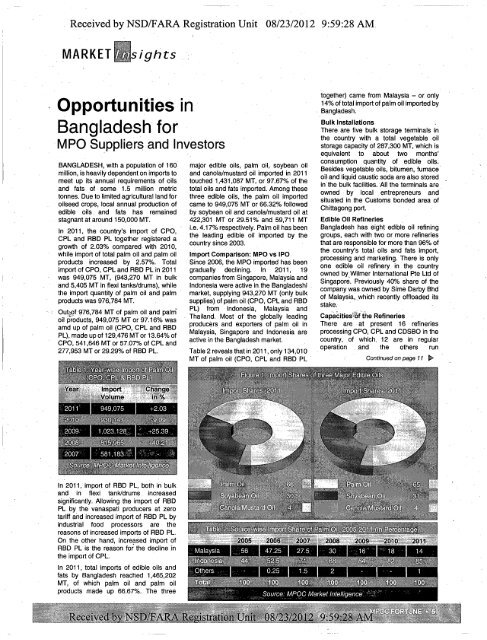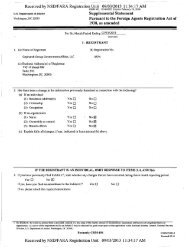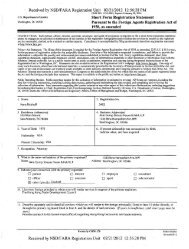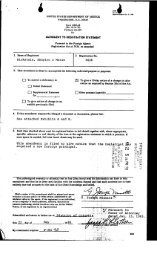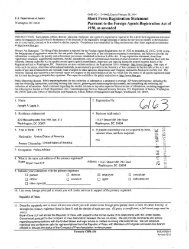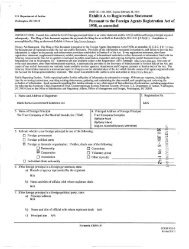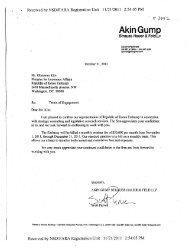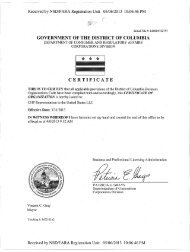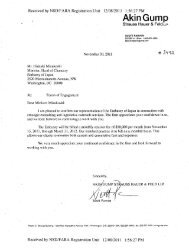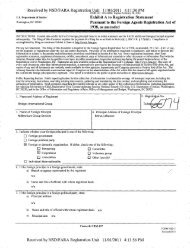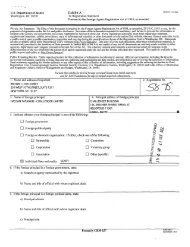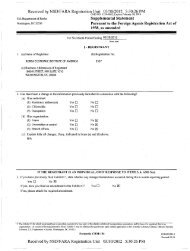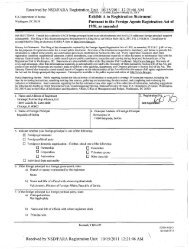Supplemental Statement - FARA
Supplemental Statement - FARA
Supplemental Statement - FARA
You also want an ePaper? Increase the reach of your titles
YUMPU automatically turns print PDFs into web optimized ePapers that Google loves.
Received by NSD/<strong>FARA</strong> Registration Unit 08/23/2012 9:59:28 AM<br />
MARKET'11 s ights<br />
Opportunities in<br />
Bangladesh for<br />
MPO Suppliers and Investors<br />
BANGLADESH, with a population of 160<br />
million, is heavily dependent on imports to<br />
meet up its annual requirements of oils<br />
and fats of some 1.5 million metric<br />
tonnes. Due to limited agricultural land for<br />
oilseed crops, local annual production of<br />
edible oils and fats has remained<br />
stagnant at around 150,000 MT.<br />
In 2011, the country's import of CPO,<br />
CPL and RBD PL together registered a<br />
growth of 2.03% compared with 2010,<br />
while import of total palm oil and palm oil<br />
products increased by 2.57%. Total<br />
import of CPO, CPL and RBD PL in 2011<br />
was 949,075 MT, (943,270 MT in bulk<br />
and 5,405 MT in flexi tanks/drums), while<br />
the import quantity of palm oil and palm<br />
products was 976,784 MT.<br />
Out*of 976,784 MT of palm oil and palm<br />
oil products, 949,075 MT or 97.16% was<br />
amd up of palm oil (CPO, CPL and RBD<br />
PL), made up of 129,476 MT or 13.64% of<br />
CPO, 541,646 MT or 57.07% of CPL and<br />
277,953 MT or 29.29% of RBD PL.<br />
Year Import<br />
Volume<br />
Change<br />
in%<br />
•'201 f " 949,075 +2.03<br />
S2009:- 1,023,12877 77,7+25.39:<br />
'581,183«h7S?«';-; : 7||<br />
In 2011. import of RBD PL. both in bulk<br />
and in flexi tank/drums increased<br />
significantly. Allowing the import of RBD<br />
PL by the vanaspati producers at zero<br />
tariff and increased import of RBD PL by<br />
industrial food processors are the<br />
reasons of increased imports of RBD PL<br />
On the other hand, increased import of<br />
RBD PL is the reason for the decline in<br />
the import of CPL.<br />
In 2011, total imports of edible oils and<br />
fats by Bangladesh reached 1.465.202<br />
MT. of which palm oil and palm oil<br />
products made up 66.67% The three<br />
major edible oils, palm oil, soybean oil<br />
and canola/mustard oil imported in 2011<br />
touched 1,431,087 MT, or 97.67% of the<br />
total oils and fats imported. Among these<br />
three edible oils, the palm oil imported<br />
came to 949,075 MT or 66.32% followed<br />
by soybean oil and canola/mustard oil at<br />
422,301 MT or 29.51% and 59,711 MT<br />
i.e. 4.17% respectively. Palm oil has been<br />
the leading edible oil imported by the<br />
country since 2003.<br />
Import Comparison: MPO vs IPO<br />
Since 2006, the MPO imported has been<br />
gradually declining. In 2011, 19<br />
companies from Singapore, Malaysia and<br />
Indonesia were active in the Bangladeshi<br />
market, supplying 943,270 MT (only bulk<br />
supplies) of palm oil (CPO, CPL and RBD<br />
PL) from Indonesia, Malaysia and<br />
Thailand. Most of the globally leading<br />
producers and exporters of palm oil in<br />
Malaysia, Singapore and Indonesia are<br />
active in the Bangladesh market.<br />
Table 2 reveals that in 2011, only 134,010<br />
MT of palm oil (CPO. CPL and RBD PL<br />
r<br />
I"" i<br />
7 Malaysia<br />
ipthers<br />
iniKiiiiiil"<br />
* ' /<br />
2005 2006 2007<br />
together) came from Malaysia - or only<br />
14% of total import of palm oil imported by<br />
Bangladesh.<br />
Bulk Installations<br />
There are five bulk storage terminals in<br />
the country with a total vegetable oil<br />
storage capacity of 287,300 MT, which is<br />
equivalent to about two months'<br />
consumption quantity of edible oils.<br />
Besides vegetable oils, bitumen, furnace<br />
oil and liquid caustic soda are also stored<br />
in the bulk facilities. All the terminals are<br />
owned by local entrepreneurs and<br />
situated in the Customs bonded area of<br />
Chittagong port.<br />
Edible Oil Refineries<br />
Bangladesh has eight edible oil refining<br />
groups, each with two or more refineries<br />
that are responsible for more than 96% of<br />
the country's total oils and fats import,<br />
processing and marketing. There is only<br />
one edible oil refinery in the country<br />
owned by Wilmer International Re Ltd of<br />
Singapore. Previously 40% share of the<br />
company was owned by Sime Darby Bhd<br />
of Malaysia, which recently offloaded its<br />
stake.<br />
Capacities of the Refineries<br />
There are at present 16 refineries<br />
processing CPO, CPL and CDSBO in the<br />
country, of which, 12 are in regular<br />
operation and the others run<br />
\.<br />
Source: MPOC Market Intelligence':<br />
Received by NSD/<strong>FARA</strong> Registration Unit 08/23/2012 9:59:28 AM<br />
Continued on page 11 •<br />
1 ~^ / I<br />
2008 2009 2010 2011


